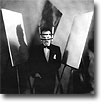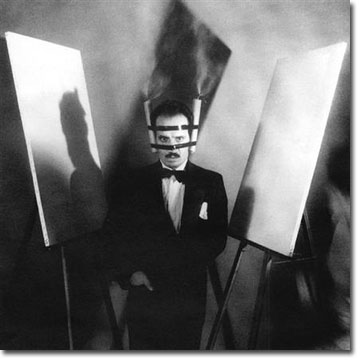David Rockefeller Center for Latin American studies,
Oct 01, 2004 - Jan 05, 2005
Cambridge, MA, USA
Adal Maldonado
by Madeline Medeiros Ruiz
Down the hall from the sun room at DRCLAS, a few pre-El Spirit Republic works hale signs of what was to come in ADÁL’s oeuvre. Photographs such as When Government Engages in Serial Murder (From the Series: I was a Schizophrenic Mambo Dancer for the FBI), 1991, suggest ADÁL’s already mounting distrust of the United States government in this satirical, yet frightening series. In this particular photograph, ADÁL lies in a tub full of water, bound and gagged, with his eyes staring straight ahead. The scenario begs the question - has the murder already happened, or is he about to be shocked by the nearly submerged electric GE fan sitting in his lap? As disturbing as the image is, it contains a healthy dose of subdued humor typical of ADÁL’s work. The realm of the ordinary clashes with that of the surreal and precarious throughout this entire series of photographs exemplified in this photograph by compositional elements like the 18 oz. box of "ready to eat" corn flakes placed on the tub’s edge behind ADÁL’s head, and a bar of soap sitting in the soap rest of this pristine, white tub.
While fundamentals of DADA, Surrealism and Post-Surrealism can be highlighted in many of ADçL’s works, past and present, it is his first endeavors in photography that most purely reference the ambitions of the first Surrealists. A series of gelatin prints entitled The Evidence of Things Not Seen (1974-75), for example, are beautifully arranged compositions representing dream-like scenarios that exhibit great experimentation with the effects of photography, light, collage and montage. The repetition of forms in these small-scale works produce maximum aesthetic effect combined with an extreme compositional efficiency. Narrative titles like Un problema con la conversación (A problem with the Conversation) and Cuarto que Guarda Recuerdos (Room that Keeps Memories) are clues to the images, and enrich the clean and proficient visual language of the photograph.
ADçL’s mini-retrospective then skips ahead to the early 1990s, leaving out work produced in the 1980s almost completely, with his Auto-Portrait series (1992-2000), photographs which portray the artist, often in ç turn poses, enacting what the titles suggest. In PAPA not DADA, the artist holds a huge brown potato between his teeth with the word PAPA written on the potato in black. In Spanglish 101: El Lipstick, ADçL holds a wooden toothpick vertically between his lips, playing on the idea of the literal translation of the word "lipstick" by a native Spanish speaker.
|













